Nurses Narratives Staff Nurse Eileen Agnes Burke
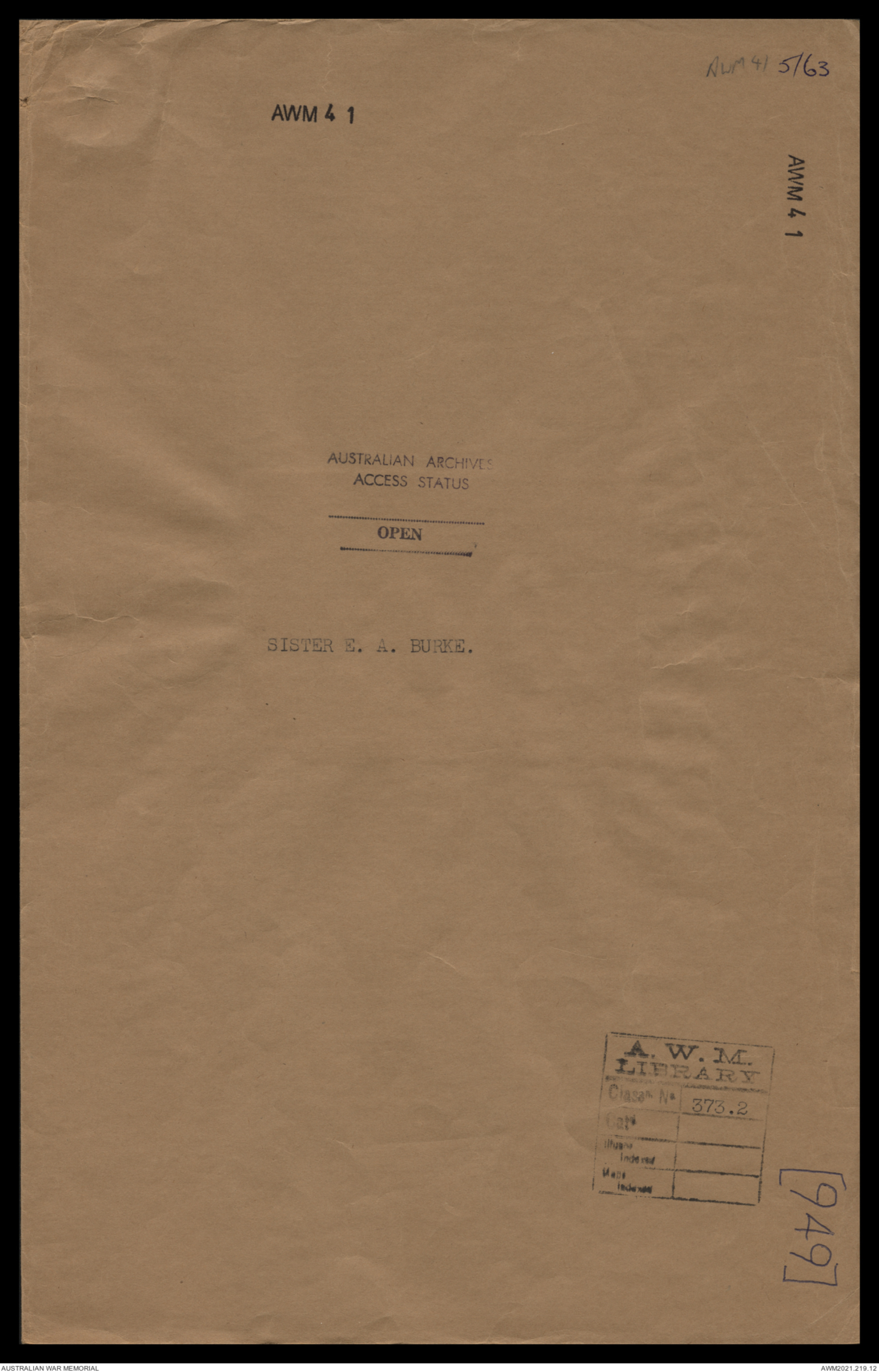
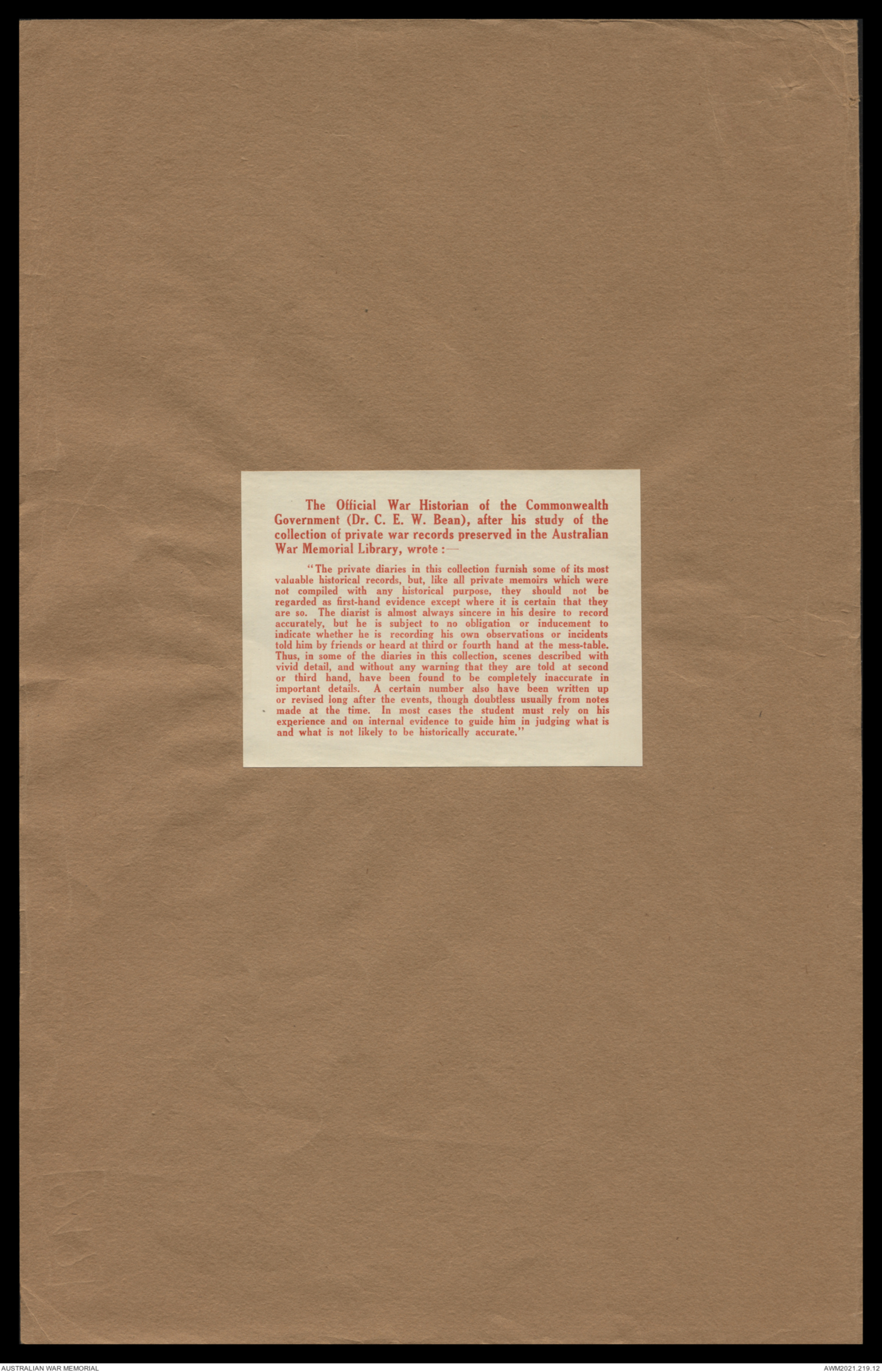
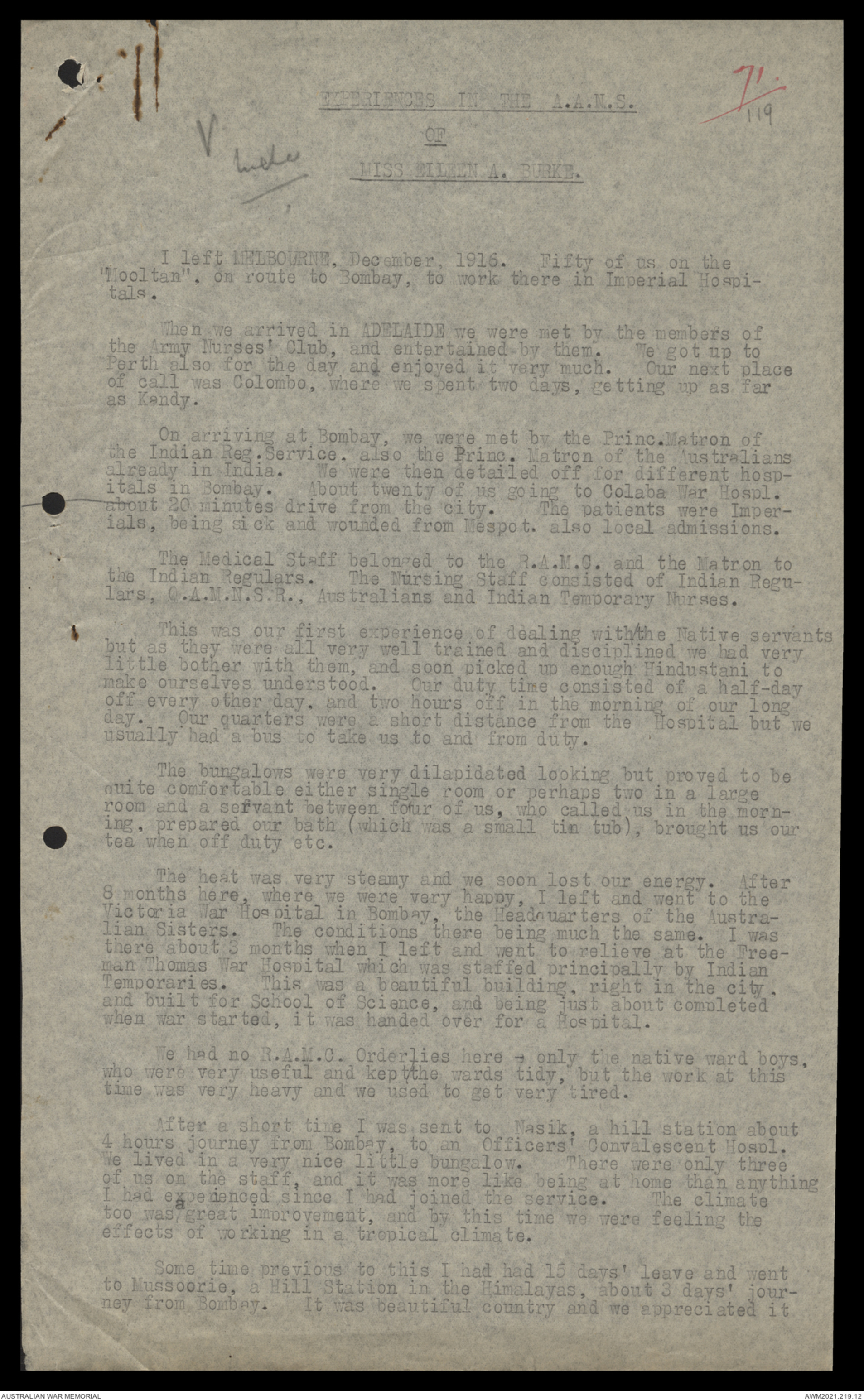
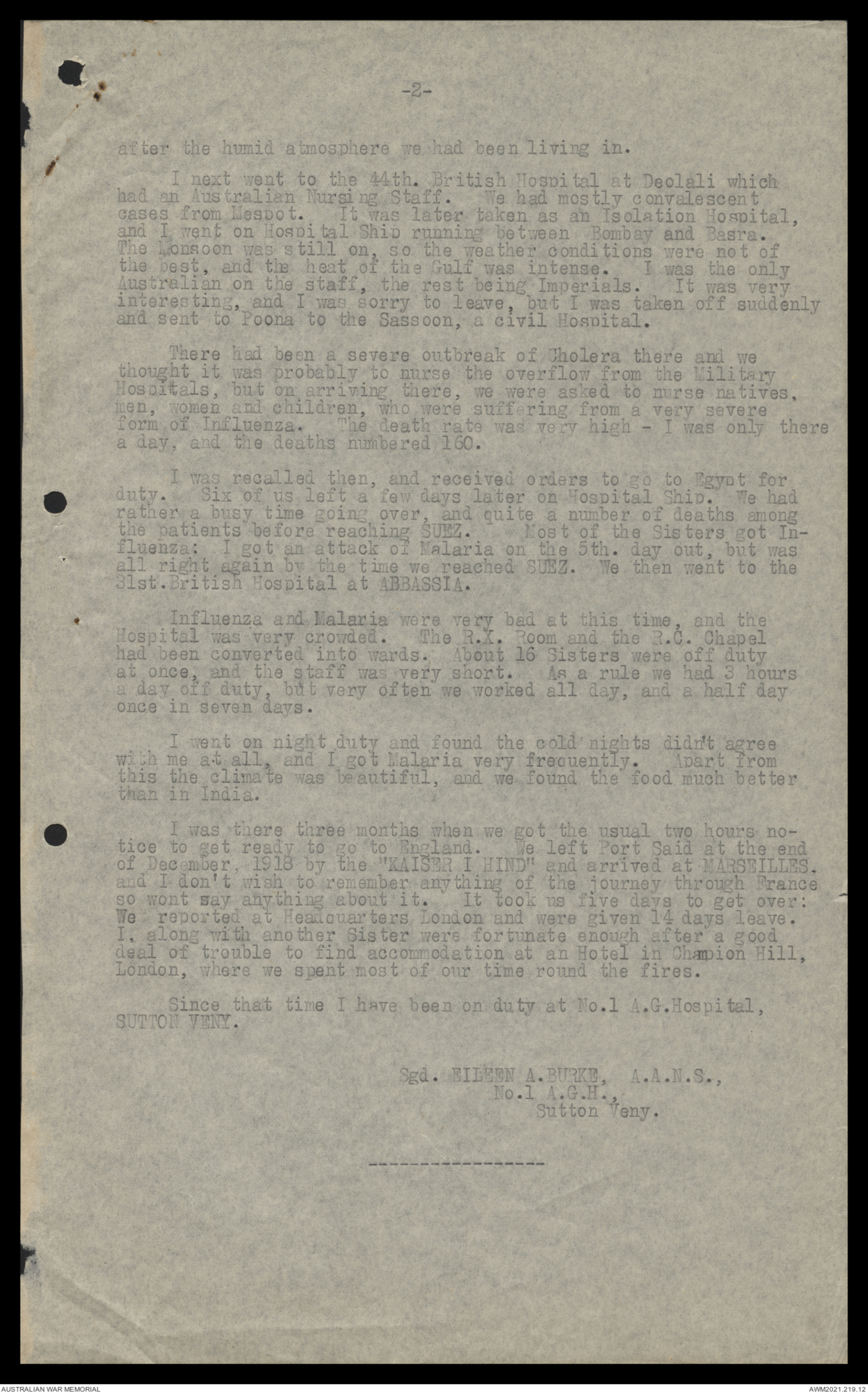
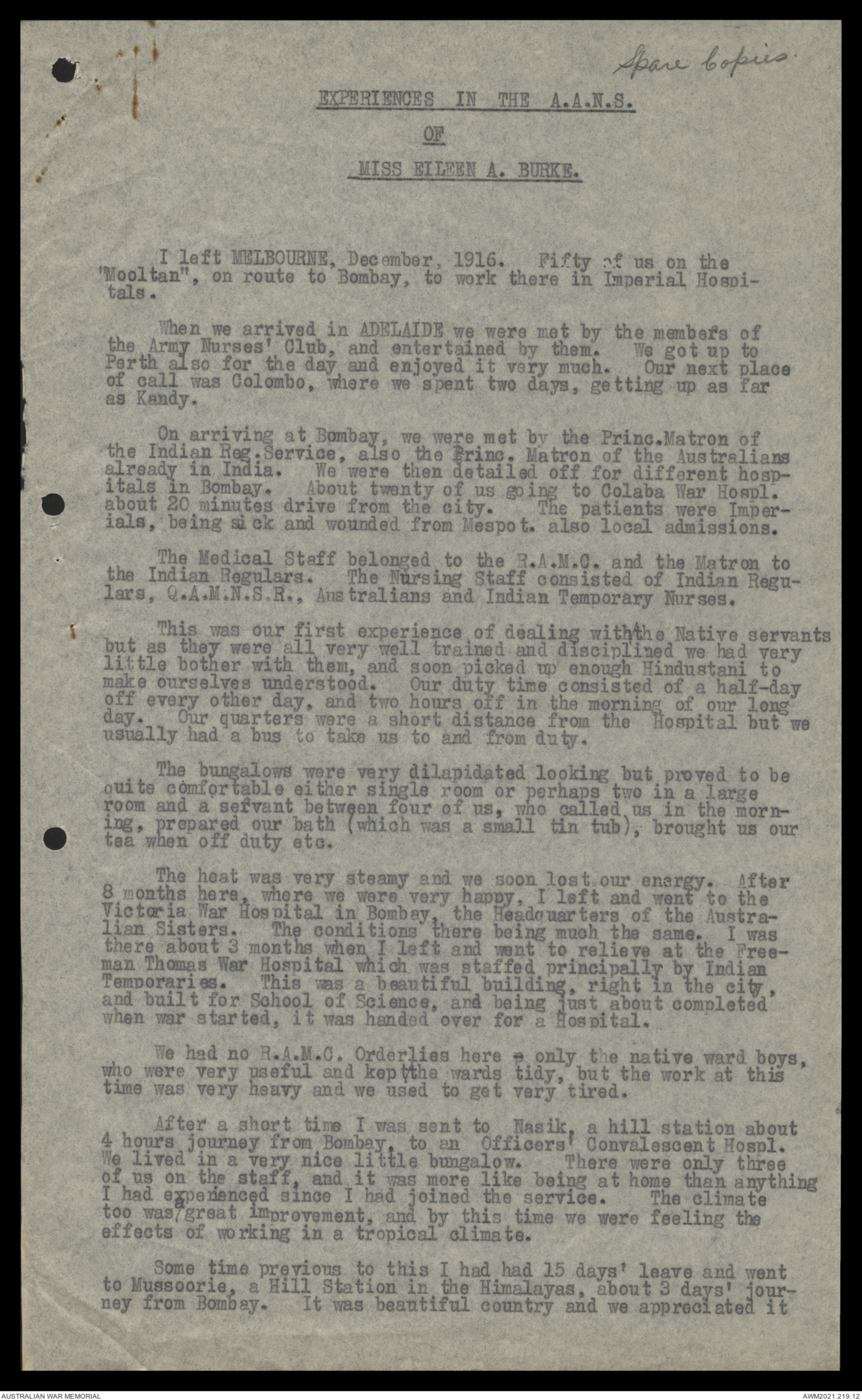
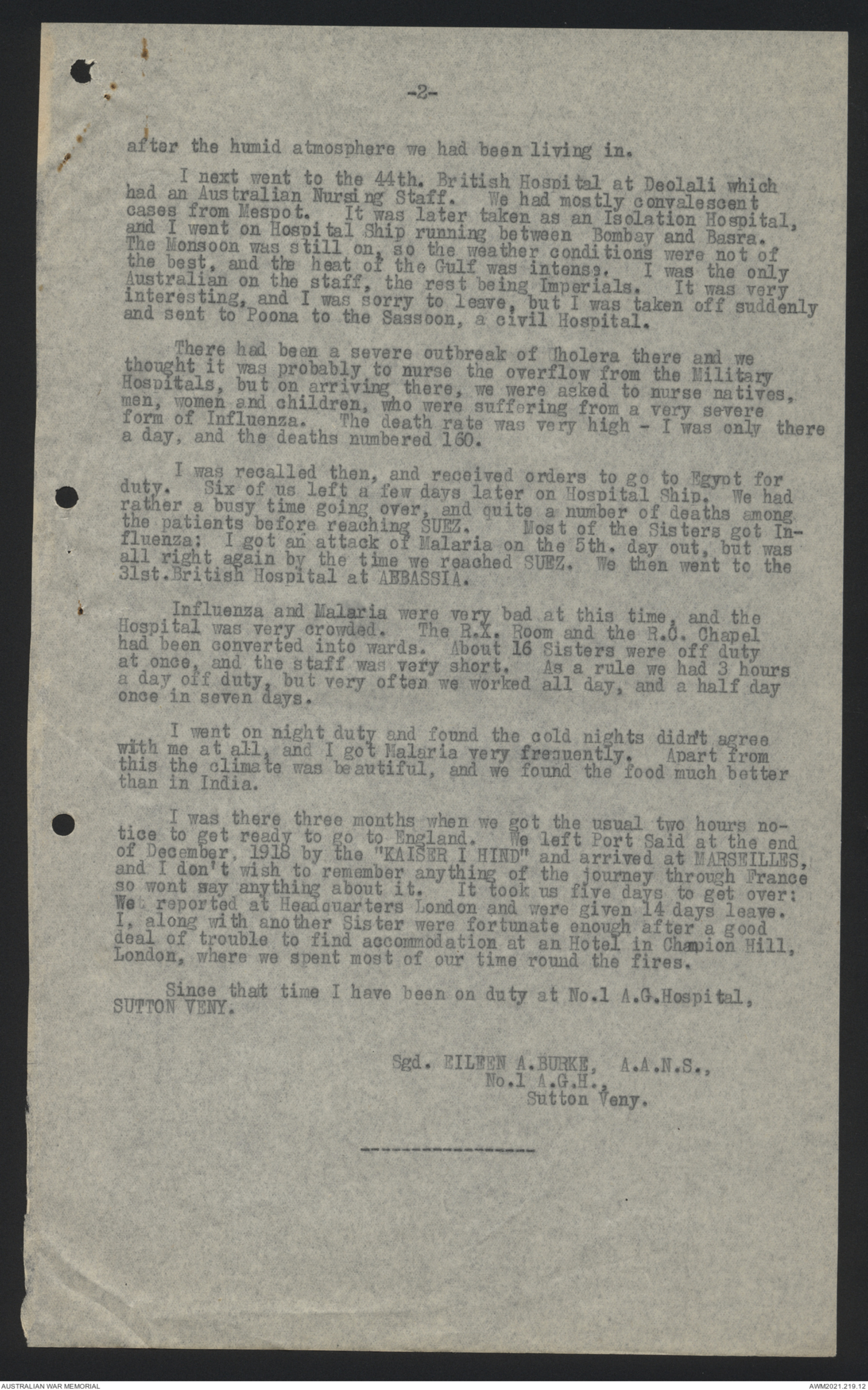
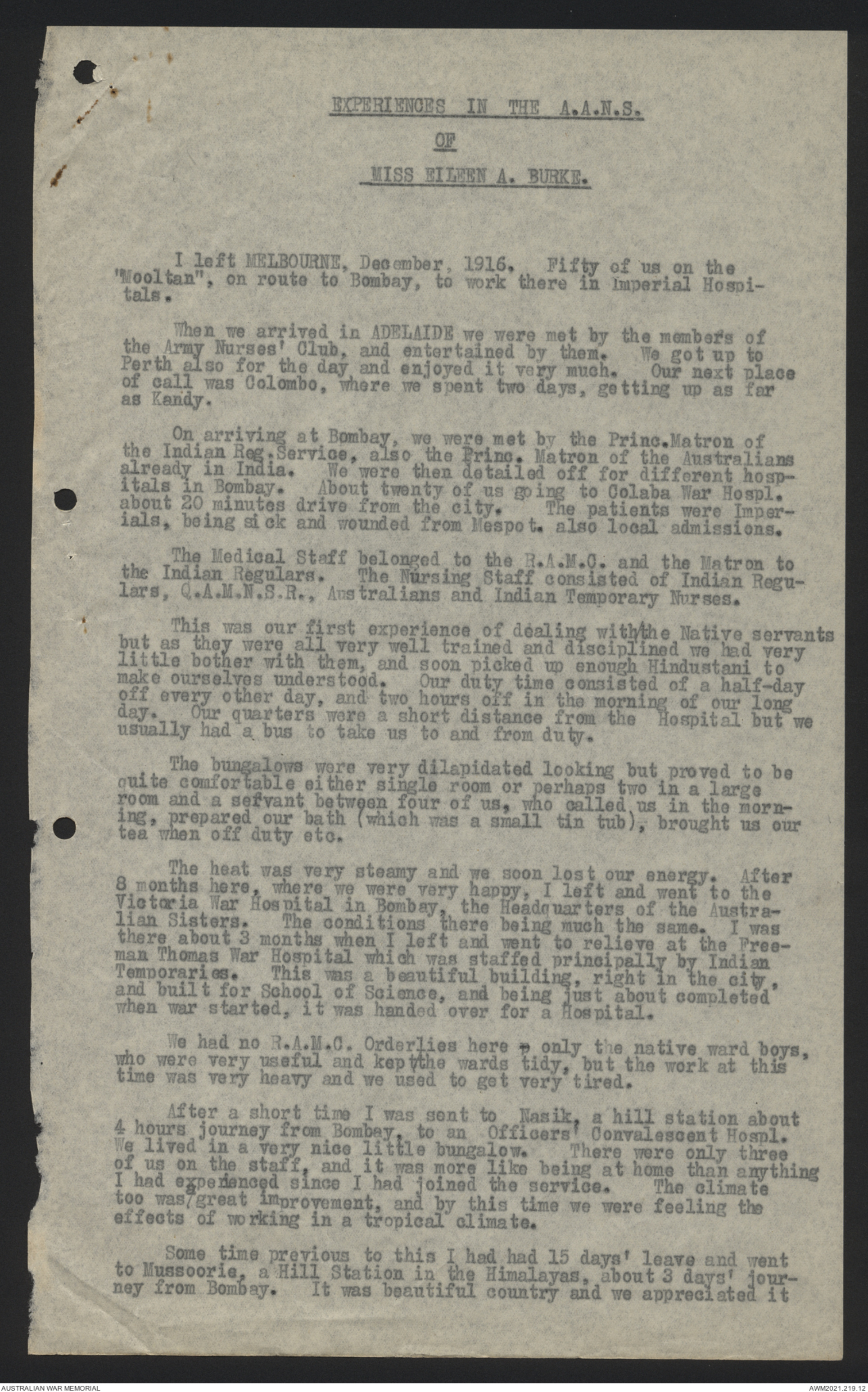
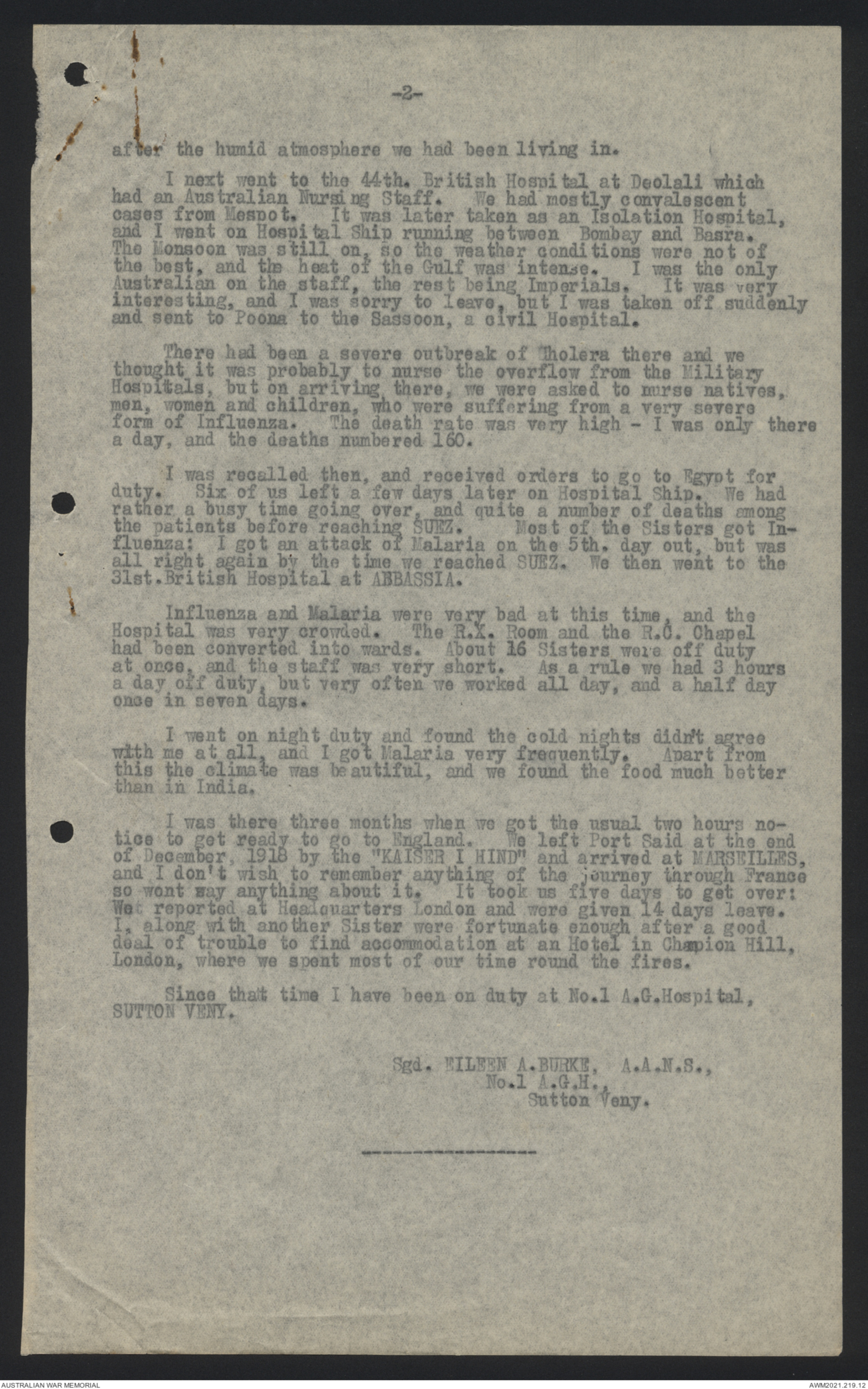
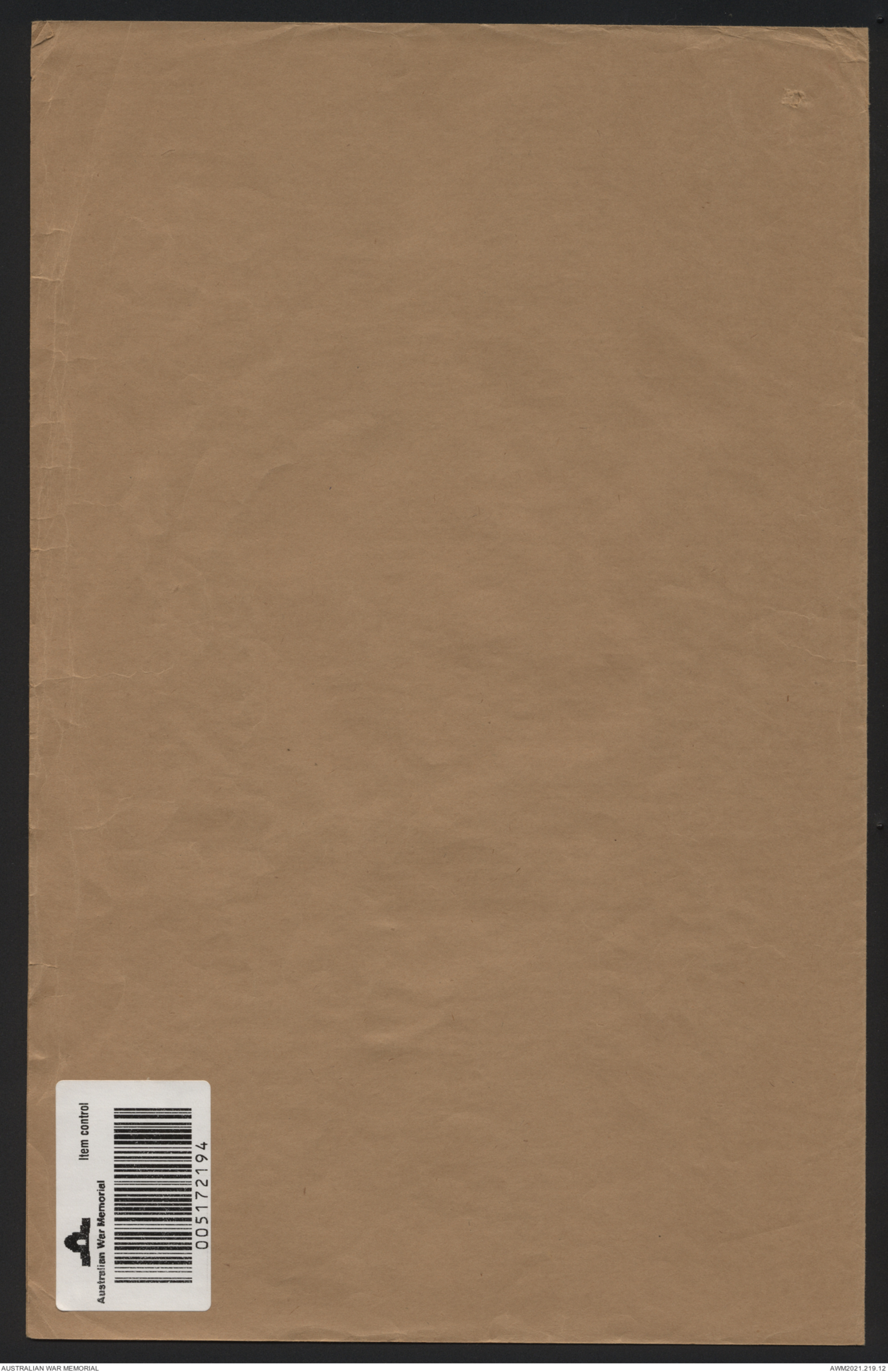
AWM 41 5/63
AWM 4 1
AUSTRALIAN ARCHIVES
ACCESS STATUS
OPEN
SISTER E. A. BURKE
[949]
The Official War Historian of the Commonwealth
Government (Dr. C. E. W. Bean), after his study of the
collection of private war records preserved in the Australian
War Memorial Library, wrote:-
"The private diaries in this collection furnish some of its most
valuable historical records, but, like all private memoirs which were
not compiled with any historical purpose, they should not be
regarded as first-hand evidence except where it is certain that they
are so. The diarist is almost always sincere in his desire to record
accurately, but he is subject to no obligation or inducement to
indicate whether he is recording his own observations or incidents
told him by friends or heard at third or fourth hand at the mess-table.
Thus, in some of the diaries in this collection, scenes described with
vivid detail, and without any warning that they are told at second
or third hand, have been found to be completely inaccurate in
important details. A certain number also have been written up
or revised long after the events, though doubtless usually from notes
made at the time. In most cases the student must rely on his
experience and on internal evidence to guide him in judging what is
and what is not likely to be historically accurate".
71—119
EXPERIENCES IN THE A.A.N.S.
OF
MISS EILEEN A. BURKE.
V
Inches
I left MELBOURNE, December, 1916. Fifty of us on the
"Mooltan", on route to Bombay, to work there in Imperial Hospitals.
When we arrived in ADELAIDE we were met by the members of
the Army Nurses' Club, and entertained by them. We got up to
Perth also for the day and enjoyed it very much. Our next place
of call was Colombo, where we spent two days, getting up as far
as Kandy.
On arriving at Bombay, we were met by the Princ.Matron of
the Indian Reg.Service, also the Princ. Matron of the Australians
already in India. We were then detailed off for different hosp-
itals in Bombay. About twenty of us going to Colaba War Hospl.
about 20 minutes drive from the city. The patients were Impe-
rials, being sick and wounded from Mespot, also local admissions.
The Medical Staff belonged to the R.A.M.C. and the Matron to
the Indian Regulars. The Nursing Staff consisted of Indian Regu-
lars, O.A.M.N.S.R., Australians and Indian Temporary Nurses.
This was our first experience of dealing with the Native servants
but as they were all very well trained and disciplined we had very
little bother with them, and soon picked up enough Hindustani to
make ourselves understood. Our duty time consisted of a half-day
off every other day, and two hours off in the morning of our long
day. Our quarters were a short distance from the Hospital but we
usually had a bus to take us to and from duty.
The bungalows were very dilapidated looking but proved to be
quite comfortable either single room or perhaps two in a large
room and a servant between four of us, who called us in the morn-
ing, prepared our bath (which was a small tin tub), brought us our
tea when off duty etc.
The heat was very steamy and we soon lost our energy. After
8 months here, where we were very happy, I left and went to the
Victoria War Hospital in Bombay, the Headquarters of the Austra-
lian Sisters. The conditions there being much the same. I was
there about 3 months when I left and went to relieve at the Free-
man Thomas War Hospital which was staffed principally by Indian
Temporaries. This was a beautiful building, right in the city,
and built for School of Science, and being just about completed
when war started, it was handed over for a Hospital.
We had no R.A.M.C. Orderlies here - only the native ward boys,
who were very useful and kept the wards tidy, but the work at this
time was very heavy and we used to get very tired.
After a short time I was sent to Nasik, a hill station about
4 hours journey from Bombay, to an Officers' Convalescent Hospl.
We lived in a very nice little bungalow. There were only three
of us on the staff, and it was more like being at home than anything
I had experienced since I had joined the service. The climate
too was a great improvement, and by this time we were feeling the
effects of working in a tropical climate.
Some time previous to this I had had 15 days' leave and went
to Mussoorie, a Hill Station in the Himalayas, about 3 days' jour-
ney from Bombay. It was beautiful country and we appreciated it
-2-
after the humid atmosphere we had been living in.
I next went to the 44th. British Hospital at Deolali which
had an Australian Nursing Staff. We had mostly convalescent
cases from Mespot. It was later taken as an Isolation Hospital,
and I went on Hospital Ship running between Bombay and Basra.
The Monsoon was still on, so the weather conditions were not of
the best, and the heat of the Gulf was intense. I was the only
Australian on the staff, the rest being Imperials. It was very
interesting, and I was sorry to leave, but I was taken off suddenly
and sent to Poona to the Sassoon, a civil Hospital.
There had been a severe outbreak of Cholera there and we
thought it was probably to nurse the overflow from the Military
Hospitals, but on arriving there, we were asked to nurse natives,
men, women and children, who were suffering from a very severe
form of Influenza. The death rate was very high - I was only there
a day, and the deaths numbered 160.
I was recalled then, and received orders to go to Egypt for
duty. Six of us left a few days later on Hospital Ship. We had
rather a busy time going over, and quite a number of deaths among
the patients before reaching SUEZ. Most of the Sisters got In-
fluenza; I got an attack or Malaria on the 5th. day out, but was
all right again by the time we reached SUEZ. We then went to the
31st. British Hospital at ABBASSIA.
Influenza and malaria were very bad at this time, and the
Hospital was very crowded. The R.X. Room and the R.C. Chapel
had been converted into wards. About 16 Sisters were off duty
at once, and the staff was very short. As a rule we had 3 hours
a day off duty, but very often we worked all day, and a half day
once in seven days.
I went on night duty and found the cold nights didn't agree
with me at all, and I got Malaria very frequently. Apart from
this the climate was beautiful, and we found the food much better
than in India.
I was there three months when we got the usual two hours no-
tice to get ready to go to England. We left Port Said at the end
of December, 1918 by the "KAISER I HIND" and arrived at MARSEILLES,
and I don't wish to remember anything of the journey through France
so wont say anything about it. It took us five days to get over;
We reported at Headquarters London and were given 14 days leave.
I, along with another Sister were fortunate enough after a good
deal of trouble to find accommodation at an Hotel in Champion Hill.
London, where we spent most of our time round the fires.
Since that time I have been on duty at No.1 A.G.Hospital,
SUTTON VENY.
Sgd. EILEEN A. BURKE, A.A.N.S.,
No.1 A.G.H.,
Sutton Veny.
[Spare Copies]
EXPERIENCES IN THE A.A.N.S.
OF
MISS EILEEN A. BURKE.
I left MELBOURNE, December, 1916. Fifty of us on the
"Mooltan", on route to Bombay, to work there in Imperial Hospi-
tals.
When we arrived in ADELAIDE we were met by the members of
the Army Nurses' Club, and entertained by them. We got up to
Perth also for the day and enjoyed it very much. Our next place
of call was Colombo, where we spent two days, getting up as far
as Kandy.
On arriving at Bombay, we were met by the Princ.Matron of
the Indian Reg.Service, also the Princ. Matron of the Australians
already in India. We were then detailed off for different hosp-
itals in Bombay. About twenty of us going to Colaba War Hospl.
about 20 minutes drive from the city. The patients were Impe-
rials, being sick and wounded from Mespot, also local admissions.
The Medical Staff belonged to the R.A.M.C. and the Matron to
the Indian Regulars. The Nursing Staff consisted of Indian Regu-
lars, O.A.M.N.S.R., Australians and Indian Temporary Nurses.
This was our first experience of dealing with the Native servants
but as they were all very well trained and disciplined we had very
little bother with them, and soon picked up enough Hindustani to
make ourselves understood. Our duty time consisted of a half-day
off every other day, and two hours off in the morning of our long
day. Our quarters were a short distance from the Hospital but we
usually had a bus to take us to and from duty.
The bungalows were very dilapidated looking but proved to be
quite comfortable either single room or perhaps two in a large
room and a servant between four of us, who called us in the morn-
ing, prepared our bath (which was a small tin tub), brought us our
tea when off duty etc.
The heat was very steamy and we soon lost our energy. After
8 months here, where we were very happy, I left and went to the
Victoria War Hospital in Bombay, the Headquarters of the Austra-
lian Sisters. The conditions there being much the same. I was
there about 3 months when I left and went to relieve at the Free-
man Thomas War Hospital which was staffed principally by Indian
Temporaries. This was a beautiful building, right in the city,
and built for School of Science, and being just about completed
when war started, it was handed over for a Hospital.
We had no R.A.M.C. Orderlies here - only the native ward boys,
who were very useful and kept the wards tidy, but the work at this
time was very heavy and we used to get very tired.
After a short time I was sent to Nasik, a hill station about
4 hours journey from Bombay, to an Officers' Convalescent Hospl.
We lived in a very nice little bungalow. There were only three
of us on the staff, and it was more like being at home than anything
I had experienced since I had joined the service. The climate
too was a great improvement, and by this time we were feeling the
effects of working in a tropical climate.
Some time previous to this I had had 15 days' leave and went
to Mussoorie, a Hill Station in the Himalayas, about 3 days' jour-
ney from Bombay. It was beautiful country and we appreciated it
-2-
after the humid atmosphere we had been living in.
I next went to the 44th. British Hospital at Deolali which
had an Australian Nursing Staff. We had mostly convalescent
cases from Mespot. It was later taken as an Isolation Hospital,
and I went on Hospital Ship running between Bombay and Basra.
The Monsoon was still on, so the weather conditions were not of
the best, and the heat of the Gulf was intense. I was the only
Australian on the staff, the rest being Imperials. It was very
interesting, and I was sorry to leave, but I was taken off suddenly
and sent to Poona to the Sassoon, a civil Hospital.
There had been a severe outbreak of Cholera there and we
thought it was probably to nurse the overflow from the Military
Hospitals, but on arriving there, we were asked to nurse natives,
men, women and children, who were suffering from a very severe
form of Influenza. The death rate was very high - I was only there
a day, and the deaths numbered 160.
I was recalled then, and received orders to go to Egypt for
duty. Six of us left a few days later on Hospital Ship. We had
rather a busy time going over, and quite a number of deaths among
the patients before reaching SUEZ. Most of the Sisters got In-
fluenza; I got an attack or Malaria on the 5th. day out, but was
all right again by the time we reached SUEZ. We then went to the
31st. British Hospital at ABBASSIA.
Influenza and malaria were very bad at this time, and the
Hospital was very crowded. The R.X. Room and the R.C. Chapel
had been converted into wards. About 16 Sisters were off duty
at once, and the staff was very short. As a rule we had 3 hours
a day off duty, but very often we worked all day, and a half day
once in seven days.
I went on night duty and found the cold nights didn't agree
with me at all, and I got Malaria very frequently. Apart from
this the climate was beautiful, and we found the food much better
than in India.
I was there three months when we got the usual two hours no-
tice to get ready to go to England. We left Port Said at the end
of December, 1918 by the "KAISER I HIND" and arrived at MARSEILLES,
and I don't wish to remember anything of the journey through France
so wont say anything about it. It took us five days to get over;
We reported at Headquarters London and were given 14 days leave.
I, along with another Sister were fortunate enough after a good
deal of trouble to find accommodation at an Hotel in Champion Hill.
London, where we spent most of our time round the fires.
Since that time I have been on duty at No.1 A.G.Hospital,
SUTTON VENY.
Sgd. EILEEN A. BURKE, A.A.N.S.,
No.1 A.G.H.,
Sutton Veny.
EXPERIENCES IN THE A.A.N.S.
OF
MISS EILEEN A. BURKE.
I left MELBOURNE, December, 1916. Fifty of us on the
"Mooltan", on route to Bombay, to work there in Imperial Hospi-
tals.
When we arrived in ADELAIDE we were met by the members of
the Army Nurses' Club, and entertained by them. We got up to
Perth also for the day and enjoyed it very much. Our next place
of call was Colombo, where we spent two days, getting up as far
as Kandy.
On arriving at Bombay, we were met by the Princ.Matron of
the Indian Reg.Service, also the Princ. Matron of the Australians
already in India. We were then detailed off for different hosp-
itals in Bombay. About twenty of us going to Colaba War Hospl.
about 20 minutes drive from the city. The patients were Impe-
rials, being sick and wounded from Mespot, also local admissions.
The Medical Staff belonged to the R.A.M.C. and the Matron to
the Indian Regulars. The Nursing Staff consisted of Indian Regu-
lars, O.A.M.N.S.R., Australians and Indian Temporary Nurses.
This was our first experience of dealing with the Native servants
but as they were all very well trained and disciplined we had very
little bother with them, and soon picked up enough Hindustani to
make ourselves understood. Our duty time consisted of a half-day
off every other day, and two hours off in the morning of our long
day. Our quarters were a short distance from the Hospital but we
usually had a bus to take us to and from duty.
The bungalows were very dilapidated looking but proved to be
quite comfortable either single room or perhaps two in a large
room and a servant between four of us, who called us in the morn-
ing, prepared our bath (which was a small tin tub), brought us our
tea when off duty etc.
The heat was very steamy and we soon lost our energy. After
8 months here, where we were very happy, I left and went to the
Victoria War Hospital in Bombay, the Headquarters of the Austra-
lian Sisters. The conditions there being much the same. I was
there about 3 months when I left and went to relieve at the Free-
man Thomas War Hospital which was staffed principally by Indian
Temporaries. This was a beautiful building, right in the city,
and built for School of Science, and being just about completed
when war started, it was handed over for a Hospital.
We had no R.A.M.C. Orderlies here - only the native ward boys,
who were very useful and kept the wards tidy, but the work at this
time was very heavy and we used to get very tired.
After a short time I was sent to Nasik, a hill station about
4 hours journey from Bombay, to an Officers' Convalescent Hospl.
We lived in a very nice little bungalow. There were only three
of us on the staff, and it was more like being at home than anything
I had experienced since I had joined the service. The climate
too was a great improvement, and by this time we were feeling the
effects of working in a tropical climate.
Some time previous to this I had had 15 days' leave and went
to Mussoorie, a Hill Station in the Himalayas, about 3 days' jour-
ney from Bombay. It was beautiful country and we appreciated it
-2-
after the humid atmosphere we had been living in.
I next went to the 44th. British Hospital at Deolali which
had an Australian Nursing Staff. We had mostly convalescent
cases from Mespot. It was later taken as an Isolation Hospital,
and I went on Hospital Ship running between Bombay and Basra.
The Monsoon was still on, so the weather conditions were not of
the best, and the heat of the Gulf was intense. I was the only
Australian on the staff, the rest being Imperials. It was very
interesting, and I was sorry to leave, but I was taken off suddenly
and sent to Poona to the Sassoon, a civil Hospital.
There had been a severe outbreak of Cholera there and we
thought it was probably to nurse the overflow from the Military
Hospitals, but on arriving there, we were asked to nurse natives,
men, women and children, who were suffering from a very severe
form of Influenza. The death rate was very high - I was only there
a day, and the deaths numbered 160.
I was recalled then, and received orders to go to Egypt for
duty. Six of us left a few days later on Hospital Ship. We had
rather a busy time going over, and quite a number of deaths among
the patients before reaching SUEZ. Most of the Sisters got In-
fluenza; I got an attack or Malaria on the 5th. day out, but was
all right again by the time we reached SUEZ. We then went to the
31st. British Hospital at ABBASSIA.
Influenza and malaria were very bad at this time, and the
Hospital was very crowded. The R.X. Room and the R.C. Chapel
had been converted into wards. About 16 Sisters were off duty
at once, and the staff was very short. As a rule we had 3 hours
a day off duty, but very often we worked all day, and a half day
once in seven days.
I went on night duty and found the cold nights didn't agree
with me at all, and I got Malaria very frequently. Apart from
this the climate was beautiful, and we found the food much better
than in India.
I was there three months when we got the usual two hours no-
tice to get ready to go to England. We left Port Said at the end
of December, 1918 by the "KAISER I HIND" and arrived at MARSEILLES,
and I don't wish to remember anything of the journey through France
so wont say anything about it. It took us five days to get over;
We reported at Headquarters London and were given 14 days leave.
I, along with another Sister were fortunate enough after a good
deal of trouble to find accommodation at an Hotel in Champion Hill.
London, where we spent most of our time round the fires.
Since that time I have been on duty at No.1 A.G.Hospital,
SUTTON VENY.
Sgd. EILEEN A. BURKE, A.A.N.S.,
No.1 A.G.H.,
Sutton Veny.
 Jacqueline Kennedy
Jacqueline KennedyThis transcription item is now locked to you for editing. To release the lock either Save your changes or Cancel.
This lock will be automatically released after 60 minutes of inactivity.